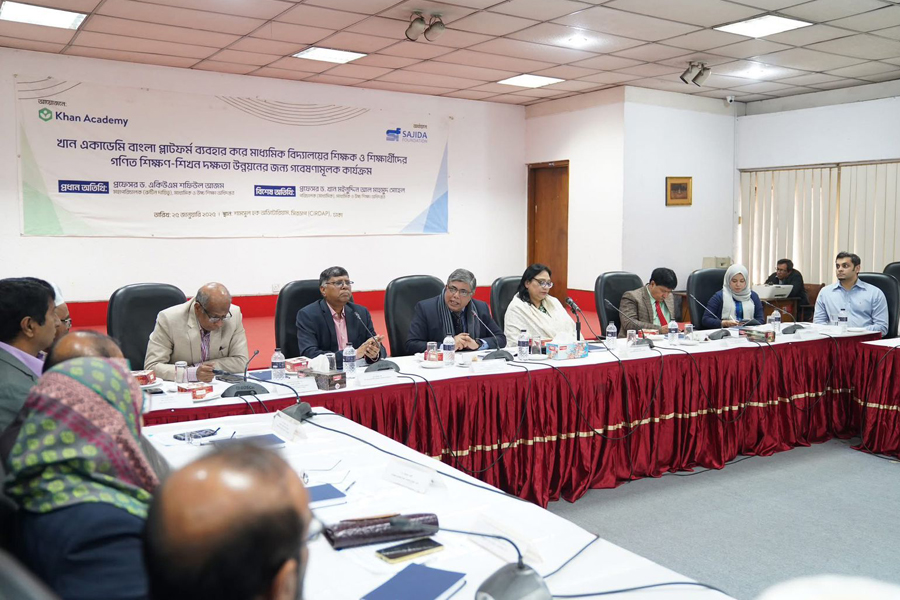SAJIDA Foundation and Khan Academy Bangladesh Launch Research Programme

Published :
Updated :

SAJIDA Foundation and Khan Academy Bangladesh organised an orientation programme in Dhaka to launch Khan Academy Bangladesh’s (KAB) Research Programme.
Representatives from the Directorate of Secondary and Higher Education (DSHE), district and upazila secondary education offices, head teachers of participating secondary schools, and other stakeholders attended the event held at CIRDAP on January 25, says a press release.
The programme commenced with opening remarks from Zahida Fizza Kabir, CEO of SAJIDA Foundation. In her speech, she highlighted SAJIDA Foundation’s journey, which began as a garage school providing education to underprivileged children. Over the years, the organisation expanded its focus to include various sectors such as women’s empowerment, mental health, microfinance, and climate change, among others.
She explained how SAJIDA Foundation is funding the Khan Academy Bangladesh research project to ensure quality education for students, leveraging the globally recognised Khan Academy platform. She emphasised the importance of the programme in providing a detailed overview of the initiative’s activities and called for collaboration at all levels to ensure its successful implementation.
Azwa Nayeem, CEO of Khan Academy Bangladesh, spoke about how the Khan Academy platform empowers students, teachers, and education leaders. The platform offers personalised learning experiences, real-time progress tracking, and interactive content that fosters deep conceptual understanding. Localised versions of the platform have already shown impact in countries such as India, Brazil, the Philippines, and Sri Lanka. The research initiative in Bangladesh aims to improve students’ foundational maths skills and make quality education more accessible, particularly in government schools.
Chief Guest, Professor Dr AQM Shafiul Azam, Director General (Additional Charge), stressed the need to embrace transformational education, which will reshape the role of teachers and prepare students for new learning modalities. The Khan Academy Bangladesh Research Programme represents an important first step in this direction, aiming to assess how the platform enhances students’ mathematical skills.
Special Guest, Professor Dr Khan Moinuddin Al Mahmud Shohel, Director (Secondary), Directorate of Secondary and Higher Education, emphasised that the success of the research programme will largely depend on the selection of schools, teachers, and students, as well as the available facilities in participating institutions. He called for close coordination, monitoring, and mutual support throughout the implementation process.
Md Abdul Majid, District Education Officer of Dhaka, shared his enthusiasm for Khan Academy Bangladesh. He expressed optimism that the programme could have a transformative impact, similar to Shikkhok Batayon, particularly for students struggling with maths. He noted that the platform would make learning maths easier and more effective.
Professor Shipon Kumar Das, Project Director of the Learning Acceleration in Secondary Education (LAISE) project, highlighted the connection between the LAISE project and the Khan Academy Bangladesh research programme. He stated that using the Khan Academy platform enhances students’ critical thinking and problem-solving skills, with Bangla-language content playing a crucial role.
Professor Md Saidur Rahman, Director (Training), Directorate of Secondary and Higher Education, emphasised the role of maths in fostering critical thinking and creativity among students. He underscored the importance of support from district and upazila education officers in supervising and strengthening these initiatives to enhance maths and science learning.
In the closing remarks, Md Fazlul Haque, Deputy CEO of SAJIDA Foundation, highlighted the uniqueness of this initiative compared to other educational projects. He stressed the importance of collaboration and regular progress monitoring to ensure the best possible outcomes from the research programme. He reaffirmed the team’s commitment to working diligently towards success.
In the second part of the programme, the Khan Academy Bangladesh team conducted a workshop with head teachers and principals. The workshop focused on how the Khan Academy platform would be utilised in schools, the potential challenges that might arise, and their possible solutions. The head teachers and principals from the selected schools enthusiastically participated in the workshop and presented their plans on how to implement the platform in their respective schools. The orientation programme organised by Khan Academy Bangladesh successfully concluded with the completion of the workshop.


 For all latest news, follow The Financial Express Google News channel.
For all latest news, follow The Financial Express Google News channel.